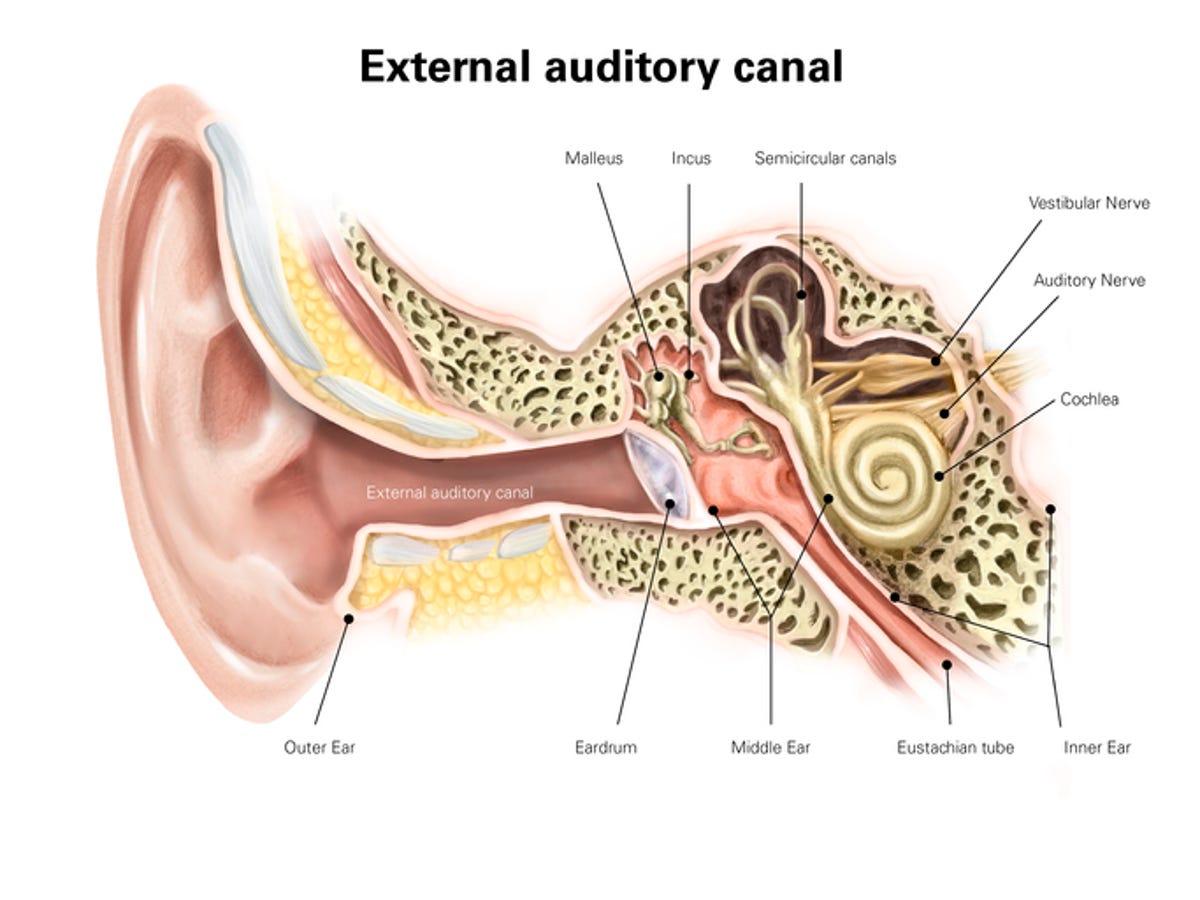Hearing loss is one of the most common medical conditions in the United States, with 37.5 million adults reporting hearing troubles. There’s no one-size-fits-all instance of hearing loss. The source, severity and treatment will differ from person to person.
With so much variation, hearing loss is a big topic. It isn’t just aging or prolonged exposure to loud noises that can degrade your hearing. There’s much more to it. Hearing loss can happen for many reasons, and sometimes it stems from things that have nothing to do with your ears.
Read more: Hearing Loss Is on the Rise. A New Wave of Tech Might Help
What are the different types of hearing loss?
Before discussing the surprising sources of hearing loss, let’s establish the types. There are three categories.
- Sensorineural hearing loss: This type involves damage to the inner ear, which is made up of the cochlea and semicircular canals. Sensorineural hearing loss is the most common type, often caused by aging, head trauma or illness.
- Conductive hearing loss: The sounds can’t get past the outer or middle ear with conductive hearing loss. This makes things sound muffled. Conductive hearing loss is often caused by illness that leads to fluid in the middle ear; an ear infection; or a hole in the eardrum. Medication or surgery can often solve the problem.
- Mixed hearing loss: This type describes an instance in which sensorineural and conductive hearing loss occur together.
Sensorineural hearing loss is treated with hearing aids from your doctor or over the counter. You can choose from over-the-ear, in-ear, or in-canal devices. Conductive hearing loss that isn’t responding to medical intervention is treatable with specialized hearing aids: bone conduction, air conduction and bone-anchored varieties.
7 things that can affect your hearing without you even knowing
Sometimes, your hearing can degrade slowly over time. So slowly that you might not even notice it. Or, you manage well enough that you miss the signs. The signs of hearing loss are subtle, like having to turn up the volume, asking people to repeat themselves and having a hard time having conversions.
Remember this list of possible causes to help your doctor find the source of your hearing loss.
Infections
Both viral and bacterial infections can impair your hearing. Something as simple as a cold or an ear infection can muffle your hearing, impair your balance or result in tinnitus. The good news is that this type of hearing loss is often only temporary. The sooner you seek treatment, the less likely the hearing loss will be permanent.
The type of hearing loss depends on the source of the infection. Generally, virus-induced hearing loss is sensorineural, though conductive and mixed hearing loss is possible. Bacterial infections of the middle ear are generally conductive hearing loss. Our body’s inflammatory response can result in fluid or mucus buildup behind the eardrum and muffle the hearing. Most cases can be resolved with medication.
Head trauma
When I say head trauma, I’m referring to anything that damages the structures of the ears or brain. That may be a blow to the head, a foreign object in your ear or an accident that damages your eardrum or canal. When something ruptures your eardrum (the membrane in the ear that keeps bacteria out), auditory signals that are usually transferred through vibrations are hindered from the ear to the brain. In the case of a ruptured eardrum, hearing loss is temporary.
It doesn’t always have to be a significant occurrence to damage your eardrum or inner ear. Even things that don’t seem like a big deal can impact your hearing. If you’ve noticed hearing loss and remember any head trauma, bringing it up with your doctor is important.

Dental problems
You probably wouldn’t connect any dental problems to issues with your hearing. However, the two are more related than you think. Bacterial infections in the mouth — from tooth infections or impacted wisdom teeth — can compromise your hearing because they cause inflammation that narrows your blood vessels. Narrowed blood vessels limit blood flow to essential ear hair cells and key brain areas.
Cochlear hair cells are located in the inner ear and function as the sensory cells for hearing. They turn the vibration from sound into electrical signals for the brain. They can become damaged or die if they don’t get enough blood, leading to permanent hearing loss.
That doesn’t mean getting a tooth infection will immediately hurt your hearing. However, it does highlight the importance of dental hygiene and addressing issues quickly to avoid unforeseen side effects.
Diabetes
According to the American Diabetes Association, if you have diabetes, you’re twice as likely to develop hearing loss. That’s because the disease can damage the nerve cells in your ears. It all goes back to sugar levels. High blood sugar levels deteriorate the cells and nerves of the inner ear. In contrast, low blood sugar levels can be just as damaging over time as they can compromise signals from the ears to the brain. Essentially, if your blood flow isn’t giving the nerves what they need to send signals to the brain, hearing loss occurs.
Even though having diabetes increases your risk for hearing loss, it doesn’t automatically mean you’ll develop it. The National Institute of Diabetes and Kidney Diseases suggests following these steps to maintain your blood sugar levels and protect your hearing:
- Continue to monitor your glucose levels regularly.
- Exercise.
- Quit smoking.
- Drink water and avoid drinks high in sugar.
- Work with your doctor to develop a diabetes-friendly meal plan.

High blood pressure
We’ve established that blood flow is essential for healthy hearing. The ear structures are delicate and sensitive to changes in blood flow. When your blood pressure is high, your heart and blood vessels are overworked. Your heart is pumping more blood than usual, which means the ear structures are overwhelmed with blood, resulting in temporary hearing loss that goes away when your blood pressure goes back down.
However, if you always have high blood pressure, it can damage the blood vessels in the ear, which is permanent. Hearing loss isn’t one of the standard side effects of high blood pressure, but it can happen.
Prescription medications
You probably wouldn’t expect a medication you get from the doctor to potentially damage your hearing, but it can occur. To be clear, it isn’t all medications. According to the American Speech-Language-Hearing Association, approximately 200 medications and chemicals can hurt hearing. See a list of these medications here.
A side effect of some medications is ototoxicity, which damages your inner ear. This can result in hearing loss, ringing in the ears or balance problems. The first sign generally is ringing of the ears or your ears feeling “full.”
Before you start taking a medication that can be ototoxic, you should have your hearing documented to have a baseline for comparison.
Sleep apnea
Recent research has linked sleep apnea to increased instances of hearing loss. A study published in the Journal of Clinical Otolaryngology found that sleep apnea increases the chances of hearing loss by 21%. Though there isn’t a definitive reason from the medical community yet, it’s likely linked to the decreased blood flow to the inner ears. Without blood flow, the cells and vessels die, which means messages won’t get from the ear to the brain.
Having sleep apnea doesn’t necessarily mean you’ll have hearing loss, but it’s another reason to be certain you’re seeking treatment. You should also keep updated assessments to be sure you’re tracking your hearing over time.
Too long; didn’t read?
There are more sources of hearing loss than most people think. You may have expected head trauma but not impacted wisdom teeth as a potential source. Here’s the thing: Just because you have any of the things on the list doesn’t mean it’ll automatically translate to hearing loss. It’s just something to remember if you notice your hearing is degrading.
Hearing assistance is more accessible than ever before. Over-the-counter hearing aids are now available, many of which you can finance to make them more affordable. You don’t have to live with hearing loss.

